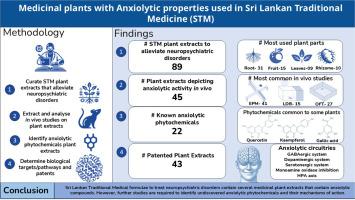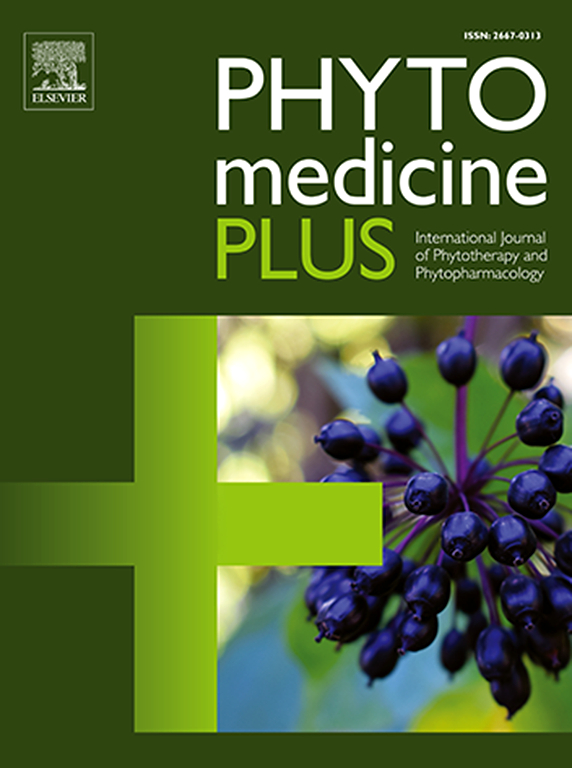Neuropharmacology and the applications of herbal extracts found within Sri Lankan traditional anxiety remedies
Q3 Pharmacology, Toxicology and Pharmaceutics
引用次数: 0
Abstract
Background
Sri Lankan traditional medicine/medical (STM) therapies to treat neuropsychiatric disorders include herb-based formulations. However, the medicinal plants, phytochemicals and their possible mechanisms of action have not been extensively reviewed before.
Purpose
This review aims to evaluate the neuropharmacological potential and applications of the medicinal plant extracts used in STM in alleviating anxiety.
Study design
This study compiles in vitro, in vivo and in silico studies that have been conducted on neuromodulatory STM plant extracts to evaluate their anxiolytic potential, anxiolytic phytochemicals, target receptors, mechanism of action, and their possible commercial value.
Methods
The keyword “unmada roga chikitsa”, was used to screen STM literature for neuromodulatory medicinal plant extracts. Next, the anxiolytic potential of the plant extracts, their putative phytochemicals, target neurotransmitter systems, were evaluated within the available scientific literacture. Finally a patent search was carried out to identify any patented formulations containing the identified plant extracts, to treat neuropsychiatric disorders, especially anxiety.
Results
A total of 89 medicinal plants found within STM formulations with possible anxiolytic properties were identified. Published in vivo studies and clinical trials further demonstrated that 45 plants within these formuations exhibit anxiolytic properties. Moreover, these plant extracts contain 22 known anxiolytic phytochemicals. Additionally, 43 plants appeared in patented formulations related to anxiety.
Conclusion
STM offers many plant based formulations that could alleviate neuropsychiatric disorders such as anxiety. However, further studies are required to identify novel anxiolytic phytochemicals, their synergistic effects, molecular mechanisms of action at target receptors and pharmacodynamics and pharmacokinetics of these plant based therapies.

神经药理学和斯里兰卡传统焦虑疗法中草药提取物的应用
斯里兰卡传统医学/医学(STM)治疗神经精神疾病的方法包括以草药为基础的配方。然而,对药用植物、植物化学物质及其可能的作用机制的研究尚未得到广泛的综述。目的综述中药提取物在缓解焦虑方面的神经药理潜力及应用。本研究综述了神经调节植物STM提取物的体外、体内和计算机实验研究,以评估其抗焦虑潜能、抗焦虑植物化学物质、靶受体、作用机制及其可能的商业价值。方法以“unmada roga chikitsa”为关键词,筛选STM文献中具有神经调节作用的药用植物提取物。接下来,在现有的科学文献中评估了植物提取物的抗焦虑潜力,其假定的植物化学物质,目标神经递质系统。最后进行专利检索,以确定含有所鉴定植物提取物的任何专利配方,用于治疗神经精神疾病,特别是焦虑症。结果共鉴定出89种可能具有抗焦虑作用的药用植物。发表的体内研究和临床试验进一步证明,这些配方中的45种植物表现出抗焦虑的特性。此外,这些植物提取物含有22种已知的抗焦虑植物化学物质。此外,43种植物出现在与焦虑有关的专利配方中。结论中药制剂可有效缓解焦虑等神经精神疾病。然而,需要进一步的研究来确定新的抗焦虑植物化学物质,它们的协同作用,作用于靶受体的分子机制以及这些植物疗法的药效学和药代动力学。
本文章由计算机程序翻译,如有差异,请以英文原文为准。
求助全文
约1分钟内获得全文
求助全文
来源期刊

Phytomedicine Plus
Medicine-Complementary and Alternative Medicine
CiteScore
3.70
自引率
0.00%
发文量
178
审稿时长
81 days
期刊介绍:
 求助内容:
求助内容: 应助结果提醒方式:
应助结果提醒方式:


